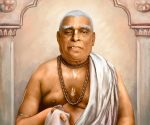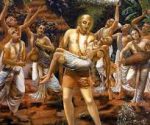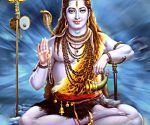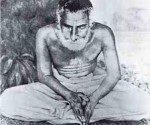Gaurakishore Das Babaji
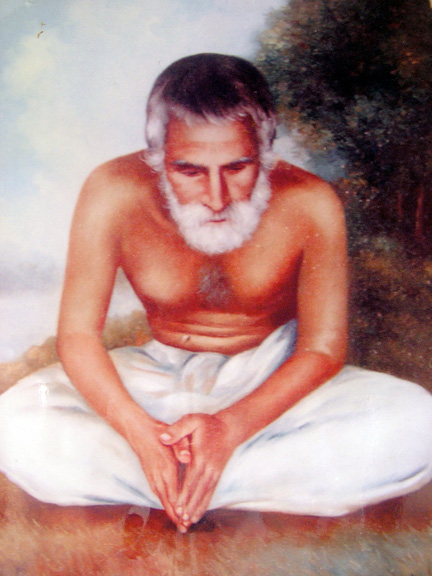 niskincanasya bhagavan-bhajanon-mukhasya
niskincanasya bhagavan-bhajanon-mukhasya
param param jigamisor-bhava-sagarasya
sandarsanam visayinam-atha yostams ca
ha hanta hanta vis-bhaksanato’py asadhu
“For one who really wants to cross the material ocean and who wants to engage in the transcendental loving service of the Lord without any connection with anything material, seeing a materialist engaged in sense gratification and seeing a woman who is similarly interested is more abominable than drinking poison willingly.” (Caitanya-candrodaya-Nataka 8.23)
The letter and spirit of this verse was the very life and soul of Gaura Kisora dasa Babaji Maharaja. He never accepted anything from materialists. He used to find cloth discarded from the bodies of the dead at the burning ghat. After washing it in the Ganges he would tear it into pieces to make some outer cloth and kaupins. He would beg some handfuls of parched rice from the houses of pious and saintly grhasthas, and then he would go and soak that rice in the Ganges until it was soft. After adding some salt and pepper he would take that as his sustenance. He would not beg for anything more than this. He was completely without material desires.
Srila Bhaktisiddhanta Saraswati Goswami Prabhupada, the founder/acarya of Sri Caitanya Matha and Sri Gaudiya Math as well as their various branches took bhagavata-diksa from this siddha-mahatma, this great-souled perfected spiritual master. Of course, Gaurakisora dasa Babaji Maharaja is a mahapurusa, a great personality, a niskincana devotee free from all material things; still, in connection with the shelter he accepted previous to manifesting his greatness as a devotee, it has been learned that he took birth in a Vaisya family by the banks of the river Padma near Tepakhola in a place called Bagayan.
When Babaji Maharaja was living in the grhastha-asrama,his name was Vamsi dasa. At that time he was maintaining his life by farming corn, in this way doing honest work and living a regulated life according to the principles of the scriptures along with his chaste and humble wife. In this way he lived for some time. Gradually he began searching for the ultimate meaning of life. Finally, the time for renunciation came. Breaking off his connection with his wife once and for all, he left family life behind and went to Vrndavana. There he came in connection with Bhagavata dasa Babaji Maharaja, one the disciples of that topmost Vaisnava, Jagannatha dasa Babaji. From Bhagavata dasa Babaji Maharaja he accepted the dress of one in the renounced order of life and thus became a Babaji after first having wandered the sixty-four miles of Vrndavana, visiting all the holy places there. At this time he maintained his life by practicing madhukari and sleeping under a different tree each night. He saw all the residents of Vrndavana as being the direct personal associates of Sri Krsna and offered his obeisances to every tree, creeper, insect, and locust in the holy dhama.
For many days he stayed in Barshan. There, among other kinds of service that he rendered, he would constantly make flower garlands for Radha and Krsna. In this way he enjoyed great transcendental happiness. Srila Babaji Maharaja stayed in Vrndavana for nearly thirty years, experiencing great inner satisfaction by render all kinds of service to the Master and Mistress of Vrndavana, Sri Radha and Krsna. After this time, by the mercy of the divine couple, he was ordered to go to Nabadwipa-dhama in Gauda-mandala. Seeing Nabadwipa-dhama as nondifferent from Vrndavana, Babaji Maharaja made his way to Gauda-mandala, the holy place of Sri Gaurasundara’s sweet pastimes. There, he visited all the holy places connected with Lord Gauranga.
At this time, Babaji Maharaja constantly found himself overwhelmed by different divine moods of ecstasy. Sometimes in one of these moods he would go to the banks of the Ganges crying “Gaura! Gaura!” and dancing, then fainting in ecstasy. On the banks of the Ganges there was a a small forest grove. There he would wander, lost in ecstatic remembrance of the divine pastimes of Radha and Govinda. Sometimes he would wander in the jungle oblivious to his own bodily existence, dressed only in his kaupina, and sometimes he would simply wander about naked. From time to time he would quietly chant the holy name with the help of his mala, his rosary of tulasi beads. And from time to time he would chant japa using a knotted cloth as beads to count the names on. From time to time he would go to Svananda-Sukhada-Kunja in Godruma. There he would stay on the porch of Bhaktivinoda’s place and hear from his lips the sacred message of Srimad-Bhagavatam. For his own part, Bhaktivinoda himself was very eager to render such a service to Babaji Maharaja, who would accept nothing material, and whose service was difficult to get.
How difficult it was to get the service of Babaji Maharaja is illustrated by the following example. Once the Maharaja of Kasi Bazaar, Manindra Chandra Nandi Bahadur, sent someone to fetch Babaji Maharaja to his royal palace. At that time Babaji Maharaja said, If I were to go to the king’s palace, the desire for riches would arise within me. So, in the king’s company mutual ill-feelings would develop between me and the king. If the king wants to be my friend, tell the king to leave behind all his material opulence and the objects of the enjoyment and come here where I am. He can live here with me, and live just as I am doing. He can make a small covering out of a straw, like those used for covering the boats used by the fisherman. There the two of us can live—the king and I—and together we can worship Hari in great ecstasy.
Babaji Maharaja use to say that one who wanders here and there to gratify the tongue, eating anything and everything in pursuit of enjoyment (bhojana) will find that his worship, his bhajana is in vain. In other words: one who wants bhojan will spoil his bhajan. Once a devotee named Haren Babu in his bhajan-kutir in Nabadwipa-dhama accepted some festival prasada in his bhajan-kutira. For this reason, Srila Babaji would not speak to him for three days. On the fourth day he said, “In your bhajan-kutira you have accepted “festival prasada” given by low-class harlots and beautiful women. Because you have eaten things without regard for where they have come from, your bhajan is useless.
Once on the anniversary of the disapperance of Srila Sanatana Goswami, Srila Babaji Maharaja said, “This afternoon we shall have a great festival, a mahotsava, for this holy day marks the passing of Srila Sanatana Goswami.” His servant, who was nearby at the time, heard him and asked, “Where will you get the things we need for a festival?” Srila Babaji Maharaja explained, “We have no need of anything. We may fast and chant the holy name of Krsna, and in this humble way we shall enjoy a great festival.”
One day, a resident of agaratala named Sri Nirendra Kumara Sena came to visit Srila Babaji Maharaja. He wanted to know the siddha-pranali, the path of perfection. Srila Babaji Maharaja told him, “You cannot know Bhagavan through your fanciful imagination. If you go on chanting the holy name, you will gradually realize the internal meaning of its syllables—the svarupa of the holy name will manifest itself. The sadhaka at that time will also realize his own internal self. At that time also, the sadhaka will awaken to his particular divine service to Sri Krsna, the service that will be dear to his heart upon attaining perfection.”
Once a certain Doctor told Srila Babaji Maharaja that he wanted to come and live in Nabadwipa Dhama so that he could heal people for free. At that time, Srila Babaji Maharaja told him, “If you really want to live in Nabadwipa, thengive up your desire to set up a free clinic; give up your plans to help the sense enjoyers by healing them. If you want to render some substantial service, then give up everything except what promotes haribhajan. All other kinds of service and duties simply bind one to a ghastly karmic reaction.
Biography # 2
In 1849, Srila Gaura Kishora Dasa Babaji left grhasta life after the death of his wife. He moved to Vrndavana and took initiation from Sri Bhagavata Dasa Babaji, a disciple of Sri Jagannatha Dasa Babaji. For over thirty years Gaura Kishora Dasa stayed in Vrndavana performing bhajana under the trees at Giri-Govardhana, Nandagrama, Varsana, Radha-kunda, Surya-kunda, Raval, Gokula.
Sitting in seclusion, he chanted 200,000 names of Krishna every day (128 rounds of japa). He felt painful separation from Radha-Govinda and cried profusely. As he wandered through the dvadasa vana (12 forests) of Vraja, he would loudly chant the holy names in a deep voice full of lamentation. He would also relish the following bhajan:
kothay go prema-mayi radhe radhe!
radhe radhe go jaya radhe radhe! dekha diya prana rakho radhe radhe! tomar kangal tomay dake radhe radhe! radhe vmdavana-vilasini radhe radhe!
radhe kanu-mano-mohini radhe radhe! radhe astha-sakhir siromani radhe radhe! radhe vrsabhanu-nandini radhe radhe!
“0 Radhe Radhe! Where are You, 0 Goddess of ecstatic love? 0 Radhe Radhe! All glories to You, 0 Radhe Radhe!
0 Radhe Radhe! Please show Yourself to me and thereby maintain my life. Your most despicable fallen servant calls out to You, 0 Radhe Radhe!
0 Radhe! Oh artful enjoyer of Vrndavana. 0 Radhe Radhe! 0 Radhe! Oh enchantress of Kanu’s (Krishna) mind. 0 Radhe Radhe!
0 Radhe! Oh crest jewel of Your eight main girlfriends. 0 Radhe Radhe! 0 Radhe! Oh delightful daughter of Maharaja Vrsabhanu. 0 Radhe Radhe!”
Srila Babaji Maharaja’s mood of renunciation was unparalleled. Sometimes he ate mud from the banks of Radha-kunda or the Yamuna. Other times he took madhukari from the Vrajavasis. Madhukari is a babaji’s daily practice of begging a little food from one to seven houses, just as a bee collects a drop of honey from each flower. He saw all the Vrajavasis (residents of Vrndavana) as being the direct personal associates of Radha and Krishna. As a result of this vision, he would pay respects to every person, cow, animal, bird, tree, creeper, insect, ant in the holy dhama.
While staying in Varsana he made a flower garland everyday for Rai and Kanu (Radha-Krishna). After thirty years of rendering intimate services to Radha and Krishna in Vrndavana, Babaji felt inspired by the Divine Couple to see Sri Navadvipa Dhama. He visited all the lila sthanas of Lord Gauranga in Gaura Mandala. In Navadvipa, he used to sing one bhajana which means, “By receiving Nitai’s mercy one gets Gauranga’s mercy, which makes one eligible for Krishna prema. With Krishna prema one can attain the service of Srimati Radharani and the gopis.”
Gaura Kishora Dasa Babaji was the embodied form of Sri Rupa-Raghunatha’s renunciation. Completely detached, he would wash discarded cloth to cover his body. He drank from a rejected clay pot. Parched rice mixed with Ganges water or simply some mud from Ganga’s bank sustained his life.
He carried two books written by Sri Narottama Dasa Thakura; Prarthana, Prema-bhakti-candrika. On Ekadasi he didn’t eat or drink a drop of water. Recognizing him to be a mahabhagavata, many tried to serve, but he never accepted.
Regularly, he associated with and heard Srimad Bhagavatam from Srila Thakura Bhaktivinoda in Svananda sukhada kunja in Godrumadvipa. Constantly absorbed in bhajana, Srila Babaji Maharaja had no desire to make disciples. On the request of Bhaktivinoda Thakura, however, he reconsidered. Upon seeing the true humility and deep attachment of Thakura Bhaktivinoda’s son for bhajana, Srila Gaurakishora Dasa Babaji accepted one disciple-Sri Varsabhanavi-dayita Dasa (Srila Bhaktisiddhanta Sarasvati Thakura).
To keep mundane people from approaching him for material boons he once resided in the lavotories at the Kuliya Dharmashal-la (in Koladvipa) for six months. When public officials came offering to build him a proper bhajana kutir, Babaji Maharaja locked himself inside and said he already had one. He believed that associating with materialistic people was much worse than the smell of stool in the latrine.
Gaura Kishora Dasa Babaji advised a Calcutta doctor who wanted lo open a free health clinic in Navadvipa Dhama: “If you really want to live in Navadvipa Dhama, then give up your desire to run a free clinic for healing sense enjoyers. If you want to render substantial service, then renounce everything except what promotes Hari bhajana. All other kinds of duties and services simply bind one to the ghastly cycle of karmic reactions.”
Babaji Maharaja spoke gravely to a newly married man: “A Vaisnava wife is extremely rare and difficult to find in this world. If one has the good fortune of having one, he should see it as a benediction from Krishna. The wife worships the husband as her lord and master. Similarly, the husband should worship the wife because she is Krishna dasi, a servant of Krishna. In this way, the husband can protect his devotional enthusiasm by not considering his wife to be his maidservant, but she is always the maidservant of Krishna.”
“One who wants bhojana (eating palatably) will spoil his bhajana,” was a favorite quote of Srila Babaji Maharaja. In other words, eating here and there simply to gratify the tongue (bhojana) destroys any attempts to worship Krishna (bhajana). Once a devotee ate some festival prasadam in his bhajana kutir. Babaji Maharaja would not speak to him for three days. On the fourth day he said, “You accepted “festival prasadam” given by low class harlots and beautiful women. Because you took food without considering its origin your bhajana is useless.”
The essence of Srila Gaura Kishora Dasa Babaji’s instructions:
“The Divine Name of Krishna offers the one and only shelter. One should never try to remember Radha-Damodara’s transcendental pastimes by artificial methods. Constant chanting of the Divine Names will purify the heart. By chanting Hari Nama the syllables of the maha-mantra (Hare Krishna Hare Krishna Krishna Krishna Hare Hare, Hare Rama Hare Rama Rama Rama Hare Hare) will gradually reveal the spiritual form, qualities, pastimes of Sri Krishna. Then you will realize your own eternal spiritual form, service, and the eleven particulars of your spiritual identity.”
In pursuance of Babaji Maharaja’s statement, “drag my dead body through the streets of Navadvipa,” a group of so-called advanced devotees proposed to commit the said sacrilege. Srila Bhaktisiddhanta Sarasvati Thakura, however, challenged them:
“According to sastra, one who has had carnal association with a loose woman within the last twenty-four hours is contaminated, and therefore not qualified to touch my Guru Maharaja.” Hearing this bold statement, the black-hearted brahmanas made a hasty retreat.
On 19 November 1915, Srila Gaura Kishora Dasa Babaji Maharaja joined the eternal blissful pastimes of Gandharvika-Giridhari. His beloved disciple, Srila Bhaktisiddhanta Sarasvati Thakura, established his samadhi on the banks of Sri Caitanya Matha’s Radha-kunda, near Lord Caitanya’s Yogapitha in Srid-hama Mayapur.
In Vraja lila he serves Srimati Radharani as Guna-manjari. His pushpa samadhi stands besides the Radha-Kunja Bihari Gaudiya Matha near Radha-kunda.
[This article and more information at www.stephen-knapp.com]




